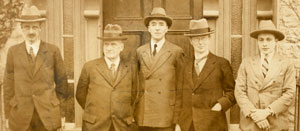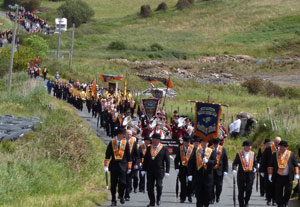A UNION SEVERED? LOYALISTS IN IRISH FREE STATE BORDER COUNTIES, 1922–7
Published in Features, Issue 1 (January/February 2023), Volume 31By Jack Hepworth

Above: The Irish Boundary Commission—F.B. Bourdillon (Commission secretary), J.R. Fisher (Northern Ireland), Richard Feetham (Chairman), Eoin MacNeill (Irish Free State) and C. Beerstacher (Feetham’s private secretary)—after its first sitting in the Mall, Armagh, 9 December 1924. (NLI)
Founded a century ago, the Irish Free State was established as a dominion of the British Commonwealth under the Crown. For the predominantly unionist Protestant minority in the Free State, however, the formal separation from Britain prompted difficult political questions. What did it mean to be a ‘unionist’ or ‘loyalist’ after Ireland’s relationship with Britain had been so profoundly redefined? Nowhere was the sense of political dislocation more acute than along the Free State’s border, in Cavan, Donegal, Leitrim, Louth and Monaghan. How did unionists in these border counties navigate their political displacement? And what did this dimension of partition mean for the foundational years of the Irish Free State?
FEBRILE POLITICAL ATMOSPHERE
After more than two years of guerrilla warfare, the Irish Free State was founded in a febrile political atmosphere. Cross-border raids and territorial disputes were routine features of the border’s inception. In Lifford, Co. Donegal, in May 1922 the IRA commandeered the Orange Hall, chased its caretaker from the county and burst into the homes of loyalists in nearby Stranorlar. In Newtowncunningham the anti-Treaty ‘Irregulars’ ordered at gunpoint a leading loyalist, James Black, to leave his 200-acre farm within the hour. Sometimes raiders claimed political authority; sometimes sheer sectarian opportunism prevailed. In County Cavan, eleven armed men raided the residence of wealthy Protestant Thomas Colby Burrows, stealing jewellery, furniture and cash. Many Protestant homes around Ballyjamesduff had been similarly plundered.
The Civil War, which raged between erstwhile republican comrades in 1922 and 1923, underlined unionists’ political vulnerability. In Pettigo, for example, which spans Donegal and Fermanagh, the majority of the population in 1922 were Protestants. The village included an Orange Hall and five Protestant places of worship. Anti-Treaty republicans sacked Pettigo in May 1922, prompting two Protestant families to flee to Canada. Loyalists’ homes were defaced. So alienated were members of the local Protestant community that, when Free State forces arrived seven months later, the majority of the local population refused to recognise their authority. Many loyalists on the ‘southern’ side of the border continued to imagine the north as a sanctuary. During a 30-hour firefight on the Louth–Armagh border in the opening salvoes of the Civil War, Louth Protestants fled to the six-county area seeking refuge.
BOUNDARY COMMISSION
Until the Boundary Commission’s report was leaked in November 1925, unionists and nationalists alike, on both sides of the border, hoped that the Commission would stipulate that the border should be redrawn. In these early years after partition, unionists in County Donegal lobbied especially energetically for boundary changes in the hope that they might be transferred to Northern Ireland. Addressing an Orange meeting in Ballinamallard, Co. Fermanagh, in 1924, Captain W.H. Fyffe MBE urged east Donegal’s Protestants to request ‘land transfers’ and implored ‘loyalists’ in the north to rally to the Free State unionists’ cause. Highlighting the scale of its Protestant population, the unionist election agent in Fermanagh–Tyrone, W.E. Orr, declared that Northern Ireland had a strong claim to much of Donegal. In May 1925 the Donegal Protestant Registration Association duly petitioned the Boundary Commission to return at least the county’s eastern Protestants to the United Kingdom.
Loyalists in the Free State frequently complained that the northern unionist élite had abandoned them. The triumphalism of Northern Ireland’s founding grandees jarred with loyalists who considered themselves victims of partition. Touring south Fermanagh in October 1923, Northern Ireland’s first prime minister, Sir James Craig, roused his audience by vowing that there would be no land concessions to the Free State. There was no border question to discuss, Craig told an ebullient crowd: the boundary suited northern unionists and they would maintain it. Craig’s bombast profoundly disappointed Protestants in the Free State.
Above: ‘Irish Free State & Northern Ireland portraying their agricultural products & fisheries 1929’. (Museum of New Zealand)
Ire was also reserved for Westminster. In 1924, congratulating the Free State government for restoring peace after the upheavals of the revolutionary period, the Orange Order’s hierarchy in Cavan and Monaghan castigated the architects of the Anglo-Irish Treaty. British plenipotentiaries and Northern Ireland’s unionist grandees alike, they argued, had deserted loyalists outside the six counties. When the Order’s grand master in County Cavan pledged support for the Free State in 1925, a spirited crowd cheered his scorn for Whitehall, which had ‘thrown [loyalists] overboard’. ‘Down with England’, one listener cried, to popular acclaim.
Orange lodges’ approach to the Dublin government differed and evolved through the 1920s. While some Orangemen repudiated the Dáil outright as an alien parliament, others committed themselves to working positively within the Free State’s political apparatus. During the marching season of 1925, Orangemen in east Donegal met their brethren in County Tyrone and pledged to campaign jointly for border revisions. By contrast, Orangemen in Cavan and Monaghan were more conciliatory towards the Free State, imploring their number to participate fully in public life. Monaghan Grand Master Knight told an 8,000-strong meeting in Newbliss that Protestants must prove themselves ‘worthy citizens’ of the ‘Saorstat’. He insisted that they live on ‘the best terms’ with their Catholic neighbours, since Orangemen could be a ‘power for good in the Free State’. Similarly, in Belturbet, Co. Cavan, W.H. Johnston swore that all Orangemen would support the Free State government ‘so long as that government protected them’. Johnston’s practical tone reflected his desire to increase Protestant representation in Leinster House. In Pettigo, racked by violence during the Civil War, a Protestant churchman told the media that he and his congregation viewed the Free State ‘with growing satisfaction’ and simply wished to live in harmony.
CRAIG ‘FULLY SATISFIED’
Leaked to the press in November 1925, the Boundary Commission report disappointed hopes of the border’s being redrawn. James Craig again disenchanted many loyalists when he declared himself ‘fully satisfied’. Notwithstanding some initial despondency, the Boundary Commission inspired realism in prominent Free State unionists, who committed themselves to defending their cultural and political traditions. Standing for election in Monaghan in 1927, Alexander Haslett told a public meeting that, while his candidacy had been ‘put forward by the Protestant people of that county’, he would represent people of all denominations. Identifying Protestant electoral candidates in Cavan (Mr Cole) and Donegal (Major Myles), Haslett outlined a pan-unionist programme to promote cross-border commerce and prosperity.
Border Protestants’ increasingly constructive approach towards the Free State contrasted starkly with the enduring bluster of loyalists elsewhere. At celebrations of the Twelfth in Ligoniel, north Belfast, in 1924, for example, the northern unionist grandee Sir Joseph Davison belligerently pledged assistance to ensure that Cavan, Donegal and Monaghan would, as ‘by right’, be restored to Northern Ireland. To cheers from the crowd, a Glasgow Orangeman bullishly pledged guns to realise Davison’s ambitions.
In contrast, border Protestants evinced a more quiescent politics. With the terror of the Irregulars’ campaign seared in their collective memory, unionists in the Free State hailed their government’s robust security policy. Cumann na nGaedheal’s punitive measures against insurrectionists inspired confidence among the Protestant minority. As the Free State’s justice minister in the mid-1920s, Kevin O’Higgins sanctioned the execution of 77 republicans. When anti-Treaty republicans assassinated O’Higgins in July 1927, loyalists in the border counties offered laudatory obituaries. A month after his death, the annual meeting of the Royal Black Preceptories in Cavan and Monaghan mourned the ‘irreparable loss’ of O’Higgins, whose ‘moral courage’ had protected the fledgling state against ‘evil doers’.
OPPOSITION TO COMPULSORY IRISH
While prepared to participate in the Free State’s institutions, Protestant politicians and civic leaders refused to acquiesce entirely in its Gaelicised cultural direction. The Irish language was the primary point of contention for Protestant educators. The bishop of Clogher, Revd Dr Macmanaway, told a prize-giving ceremony at Clones High School that if the school insisted on making Irish-language classes compulsory Protestant parents should remove their children and send them to schools in County Fermanagh instead. Macmanaway framed this as a matter of practical imperative: a farmer would have no call for the language, needing more fundamentally to earn his ‘bread and butter’. County Cavan District Master John W. Vogan regarded Irish as a useless language: ‘Most of our children are for export to the United States, Canada, Australia, and New Zealand, where only the English language runs’.
Loyalists who engaged with the civic and political apparatus of the Irish Free State found solace in continuing to identify with the British Empire. Partly for reasons of political self-preservation, wealthier loyalists asserted that their imperial identities were compatible with allegiance to the Saorstat. Presiding at an Orange meeting in 1927, District Master Vogan asserted that ‘as Orangemen we are unswerving in our loyalty to King and Crown’. Yet the same Orangemen could also profess to be ‘the most law-abiding citizens of the Irish Free State … As Orangemen, we have very big interests in the Free State, and we are large taxpayers, and we think for those reasons our voices should weigh with the powers that be.’ Vogan was enthused to note that Protestant representatives were ‘welcomed in the Dáil’.
Like many of their nationalist counterparts across the island of Ireland, the majority of loyalists in the Free State considered partition a tragedy. Protestants in Cavan, Donegal and Monaghan especially lamented the fracture of Ulster’s historic province. Crucially, however, a combination of political pragmatism and the Free State’s dominion status within the Commonwealth enabled southern loyalists to negotiate their dislocation. In a statement that encapsulated these complex issues of identity, the Revd Brother McAlister of County Cavan, for example, was able to reassert the Cavan Orangemen’s ‘unswerving loyalty and devotion to King George, our Sovereign Lord and King’. McAlister could position his community among the Free State’s ‘dutiful subjects’ while simultaneously ‘rejoic[ing] that we are part and parcel of the greatest Empire in the world, on whose flag the sun never sets’.
Jack Hepworth is Canon Murray Fellow in Irish History at St Catherine’s College, Oxford.
Further reading
R. Bury, Buried lives: the Protestants of southern Ireland (Cheltenham, 2017).
I. d’Alton & I. Milne (eds), Protestant and Irish: the minority’s search for a place in independent Ireland (Cork, 2019).
D. Fitzpatrick, ‘The Orange Order and the border’, Irish Historical Studies 33 (129) (2002), 52–67.
P. Leary, Unapproved routes: histories of the Irish border, 1922–1972 (Oxford, 2016).

















